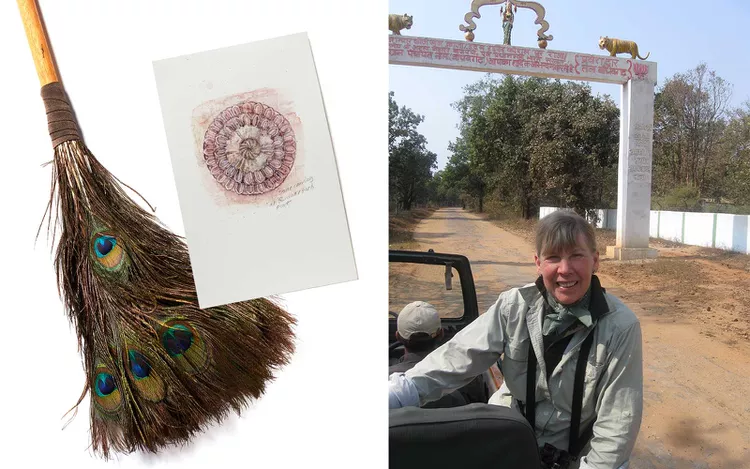For her latest project, the writer and illustrator immersed herself in the extraordinary sights of Madhya Pradesh — central India’s tiger territory.

Jan Brett creates worlds where magic happens — where honey badgers talk, hedgehogs explore space, and trolls steal your Christmas decorations.
The author, who has sold more than 40 million books, has been a family favorite for decades. What fans might not know is that the Berkshires-based Brett takes extensive research trips to build her elaborate, enchanting realms, from Norway, Botswana, and Japan to Arctic Alaska (for an upcoming book about a musk ox).
India’s ‘Palace on Wheels’ Offers One of the Most Luxurious Train Rides in the World
Her latest work, The Tale of the Tiger Slippers, is based on a Middle Eastern folk tale. Unlike in the original, it’s not merchant Abu Kassem who learns an important lesson, but a Bengal tiger — one that lives in a kingdom inhabited by crocodiles and sloth bears.

Brett visited Bandhavgarh, Kanha, and Panna national parks in Madhya Pradesh, home to India’s largest population of tigers. She sketched details such as a carving at Bandhavgarh Fort and browsed local markets for treasures like a jaunty peacock feather duster. “Travel helps me feel like I’m in the world of my book,” Brett says, “and then I just use my imagination.”
“During a research trip, I am very focused on gathering material to make the book authentic — almost like a treasure hunt. For Tiger Slippers, my husband, Joe, and I went on several wildlife drives with a guide and tracker, who can recognize each individual tiger. I didn’t take many pictures because I like to use my eyes. I was looking for the way the tigers move, their different expressions. Each face is unique.”

“Before traveling, I studied Mughal court art — beautiful paintings of aviaries and gardens, with these amazing borders. And architecture! We saw this ancient temple at Bandhavgarh Fort, which inspired some buildings in the book.”

“Joe and I enjoy birding — I love that it forces you to stop, be quiet, and listen. We saw around 325 species, some that can be found only in this one area of India. I loved the blossom-headed parakeet and the racket-tailed drongo. In Kanha, there were peacocks everywhere!”

“One of the best parts of the trip was seeing the villages and countryside en route to the parks. Oxcarts and water buffalo were everywhere, and women wore colorful saris. I went into town to buy some fabric, clothing, and wooden figurines.”

“We also saw hornbills, langurs, and gaurs, the largest wild bovine on earth. And elephants being ridden by keepers, called mahouts, patrolling for poachers. On one solo walk in Panna, I spied a small jungle cat sitting in the sun. I really treasure having had that sighting all to myself.”

“On any tiger safari, there is a possibility that you won’t see one up close. But one day, in Bandhavgarh, there was a huge male coming through the grass. First, he roared — the fearsomeness and beauty hits you somewhere vestigial. Then he stretched up, seven feet tall, and started scratching a tree, just like a little cat. The whole trip revolved around those ten minutes.”
Trip Planner
Getting There
Jabalpur is the gateway city for the parks of Madhya Pradesh. Air India has two-hour flights from New Delhi, as does SpiceJet, which also offers connections from Mumbai and other major cities.
Wildlife Camps
Brett stayed at a trio of Taj safari camps: Mahua Kothi, in Bandhavgarh National Park, Banjaar Tola, in Kanha, and Pashan Garh, in Panna.
Travel Advisor
Carole Cambata, an India specialist on the GoTravelDaily A-List, can plan a “tiger-safari” itinerary or integrate Madhya Pradesh into a larger central India trip.
A version of this story first appeared in the January 2020 issue of GoTravelDaily under the headline Adventures in Tiger Kingdom.





